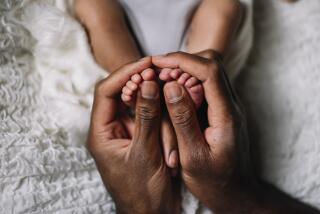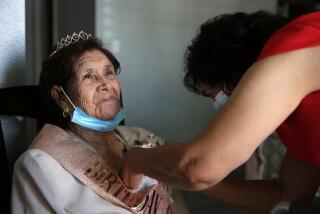Grandpa Lessons for Haters of Plaid
- Share via
GRANADA HILLS — Recently my younger brother, who’s not yet 50, became a grandfather. This set a small but unignorable warning sign flashing over my own horizon:
ROLE CHANGE COMING! . . . ROLE CHANGE COMING! . . .
Neither of my daughters, who are closing in on 24 and 21, is in any immediate danger of procreating (so far as I know). But if grandpa status could happen to my kid brother, it probably could happen to me. Here is my problem:
Parenting is a torturous, improvisational main role in the long drama of a child’s progression from foot sucking to Little League to driver’s insurance to retirement-account-depleting tuition bills.
Grandparenting, however, ought to be a star turn.
The mass-media culture has posted in our minds the stereotype of the grandfather as an easygoing, flannel-shirted chap who makes an appearance from time to time to show a child how to catch a fish, whittle a stick and be at peace with life.
Well, what about us neurotics? We who have caught maybe one smallmouth bass in our lives, hate plaid and are generally kept away from sharp objects on account of continuing bewilderment over the mystery of existence?
For us, being a grandfather could turn out to be harder than being a father.
In need of guidance, I took myself to the home office of Anita Miller, a geriatric consultant who not only is a grandmother, but gives classes to others on how to grandparent right.
The grandparenting biz, she said, has changed in recent years. Those of us on the leading edge of the postwar generation are in for some surprises if our notions of grandparenting run exclusively to what our grandparents and parents did when they had the gig.
To demonstrate, Miller opened her computer cabinet, got onto the Internet and went to the home page devoted to her youngest grandchild. “Elfland, Featuring Sydney Cassandra,” was designed by Miller’s son-in-law. It offered various links reading, “Click here for new photos,” and “Click on this picture to see my first few hours” and “Click on this picture to get the latest news about me.”
E-mail, too, Miller said, is a marvelous way for au courant grandparents to stay in touch with grandchildren, who are becoming computer-capable at tenderer and tenderer ages.
Miller said she encourages grandparents to get involved in their new status even before the first grandchild debuts. They’d do well, she said, to brush up, for example, on the modern-day approach to birthing, which often is quite a different thing from what they experienced themselves.
Miller, who is 59, was present at the birth of two of her three grandchildren. “As the official videographer, I didn’t do a very good job,” she said. “Tears kept filling up my eyes and running down my face. Childbirth really is a miraculous thing, you know.”
Changes in life expectancy have altered grandparents’ prospects, she said. Grandparents used to gush love partly to establish emotional ties with grandchildren quickly, knowing they likely wouldn’t be around long enough to take a more casual approach.
Miller herself became a grandmother 10 years ago, which means that if she lives to be 89--her mother is a healthy 82--she’ll have had 40 years with her first grandchild. “Being a grandparent is not an end-of-life issue any more,” she said. “Now it’s a middle-age issue.”
Whatever aspects of grandparenting have changed, however, the essentials haven’t, Miller said. A good grandparent is still a font of reminiscences that help a grandchild understand the biological stream called family history of which he or she is part.
And, let’s face it, when grandparents bid adieu to this vale of tears, they perform a service, delivering a vital early lesson to grandchildren about life’s finiteness and value, while the grandchildren still have the security of living parents.
Miller instructs her classes in the important “don’ts” of grandparenting.
Don’t get grandchildren in the habit of expecting gifts every time they see you.
Don’t discriminate among grandchildren.
Don’t be a criticizing know-it-all to parents “just because you’re old and wise and have all the answers. They’re the fathers and mothers. You had your chance, and now it’s their chance.”
Don’t let yourself be exploited as an ever-available baby-sitter whose price is always right.
And, finally, don’t try to force yourself to fit grandparent stereotypes that don’t reflect who you really are. “Do what’s comfortable for you,” she said, “because you’ll be a much better grandparent if you’re comfortable and not frazzled.”
Well, Miller’s granddaughter’s Web site gives me an even better idea. If I can’t be the ideal grandfather, I can always construct my own home page--”Grandpa World.”
Its background will be one of Pendleton Wool’s classic shirt plaids. It will have links to well-researched, expert instruction in whittling, up-to-date catalogs of bass lures, stirringly written (and carefully edited) accounts of my boyhood.
And, of course, my grandchildren will be free to e-mail me with any questions they have about the meaning of life, and I’ll get back to them right away, in a flash, tout de suite, just as soon as I’ve figured it out myself.
More to Read
The biggest entertainment stories
Get our big stories about Hollywood, film, television, music, arts, culture and more right in your inbox as soon as they publish.
You may occasionally receive promotional content from the Los Angeles Times.










